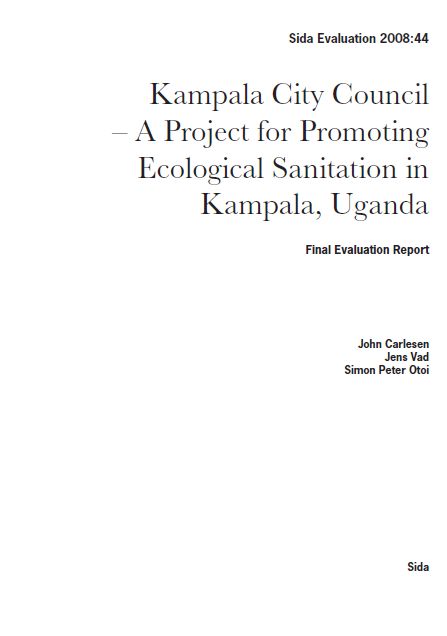Kampala City Council - A project for promoting ecological sanitation in Kampala, Uganda - Final evaluation report
Carlesen, J., Vad, J., Otoi, S. (2008)

Published in: 2008
Publisher:
Swedish International Development Cooperation Agency (SIDA), Stockholm, Sweden
Author:
Carlesen, J., Vad, J., Otoi, S.
Uploaded by:
SuSanA secretariat
Partner profile:
common upload
5728 Views
46 Downloads
Location of library entry
Content - Summary
Sida has supported the promotion of EcoSan in Kampala City Council (KCC) since 2002 through the Lake Victoria Programme. Ecological sanitation is based on the principle that urine, faeces and waste water are resources in the ecological cycle (loop). The Kampala EcoSan Project makes use of dry toilets to separate urine from faeces and through recycling, and makes proper use of the two to support crop production. Important characteristics of this type of EcoSan are separation at source, efficient destruction of pathogenic organisms and recycling of urine and faeces, thereby ‘closing the loop’.
The Evaluation Team (ET) has identified the following conclusions and lessons of general validity regarding design and management of pilot projects aiming at developing and testing new ideas and new approaches:
• The implementation responsibility and capacity must match the strategic requirements of the project;
• This has to be ascertained in an analysis of functions of the stakeholders, legal framework and a thorough institutional and management capacity assessment in the project design phase;
• KCC top managers did not have ownership to this project from the project start and signing of the project agreement took some convincing. This was a serious mistake; donors should never promote ownership even when the project idea is the obvious solution to a real problem of the donors target group;
• In pilot projects flexibility is a must. Analytical capabilities and strategic management skills are required in order to implement in a cost effective manner. Documentation of lessons learnt in a
SMART monitoring and management information system is of strategic importance. Hence, the full integration of pilot projects in the institutional structure of the responsible executive organisation
may not be the best solution, if this organisation has a bureaucratic management system and an objective which differs in nature and scope from the nature and scope of the pilot project.
Based upon the assessment of achievements, constraints and potentials the ET conclude that EcoSan can become a cost-effective, commercially viable and sustainable solution to the sanitation problems of low laying areas
of Kampala under the following assumptions:
• A national policy is approved;
• A KCC strategy and action plan is developed;
• A nationwide Media Campaign is initiated to enhance the status of EcoSan;
• Consumers of farm products accept “EcoSan Foods”;
• EcoSan zoning is introduced as part of urban environmental planning and management;
• The laws of Uganda are adjusted, especially in the light of the EcoSan Strategy (under development)
to include EcoSan as one of the recognised sanitation methods.
• Certification of affordable and hygienic designs are introduced and the models are promoted in the
market;
• Parish Development Plans include EcoSan in a “holistic approach” to urban environmental planning
and management – including grey-water handling, drainage, solid waste, urban greening etc;
• Appropriate funds and fi nance mechanisms are made available as credit to households replacing pit
latrines with EcoSan, and with public-private partnerships which establish commercially viable
collection and transport systems for the EcoSan Products;
• KCC has the capacity to monitor the health aspects of the scaled-up EcoSan system.
Bibliographic information
Carlesen, J., Vad, J., Otoi, S. (2008). Kampala City Council - A project for promoting ecological sanitation in Kampala, Uganda - Final evaluation report. Swedish International Development Cooperation Agency (SIDA), Stockholm, Sweden
Filter tags
English Sub-Saharan Africa Urban (entire city) Urban informal settlements (slums) Urine diversion dehydration toilets (UDDTs)














